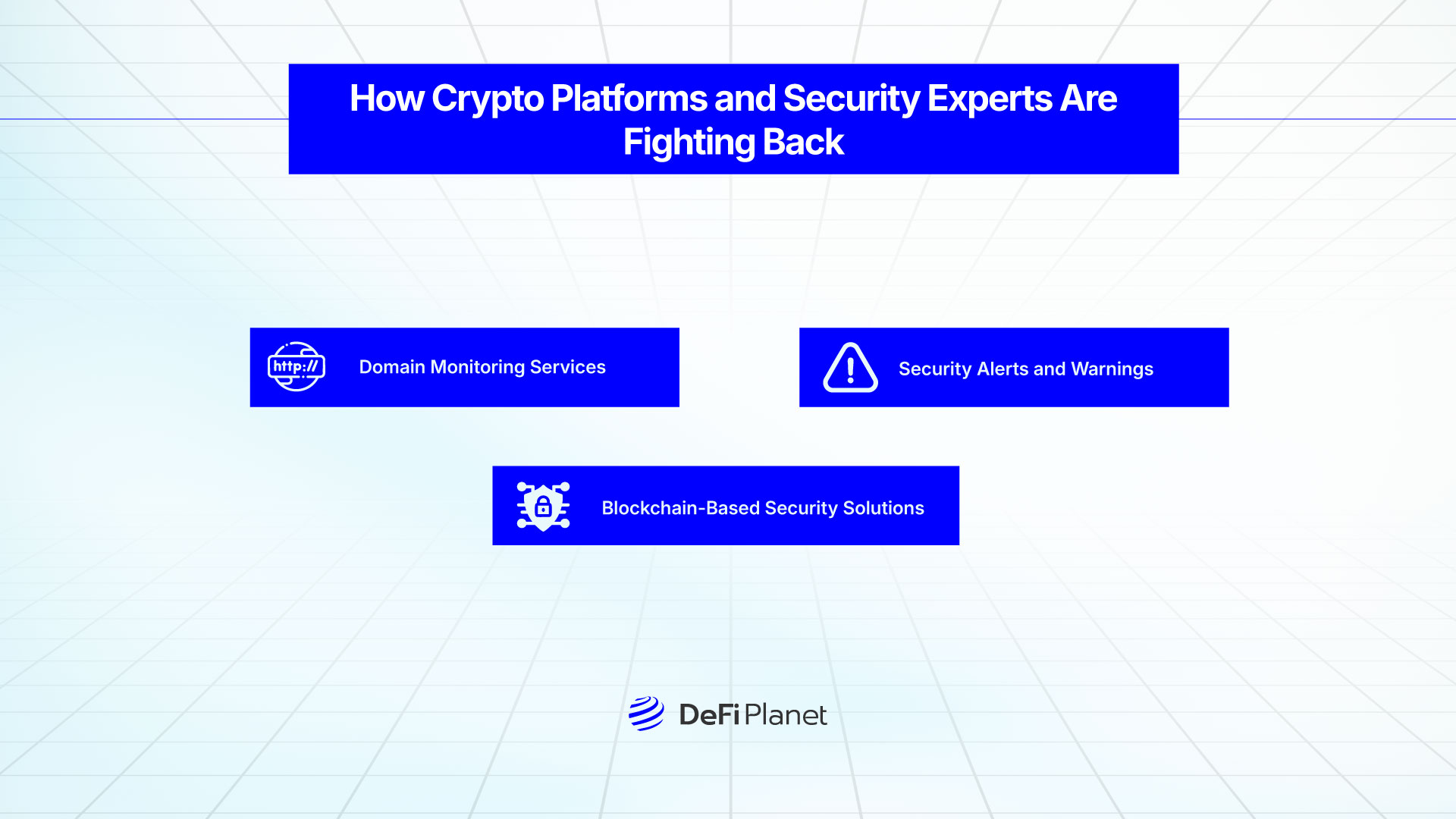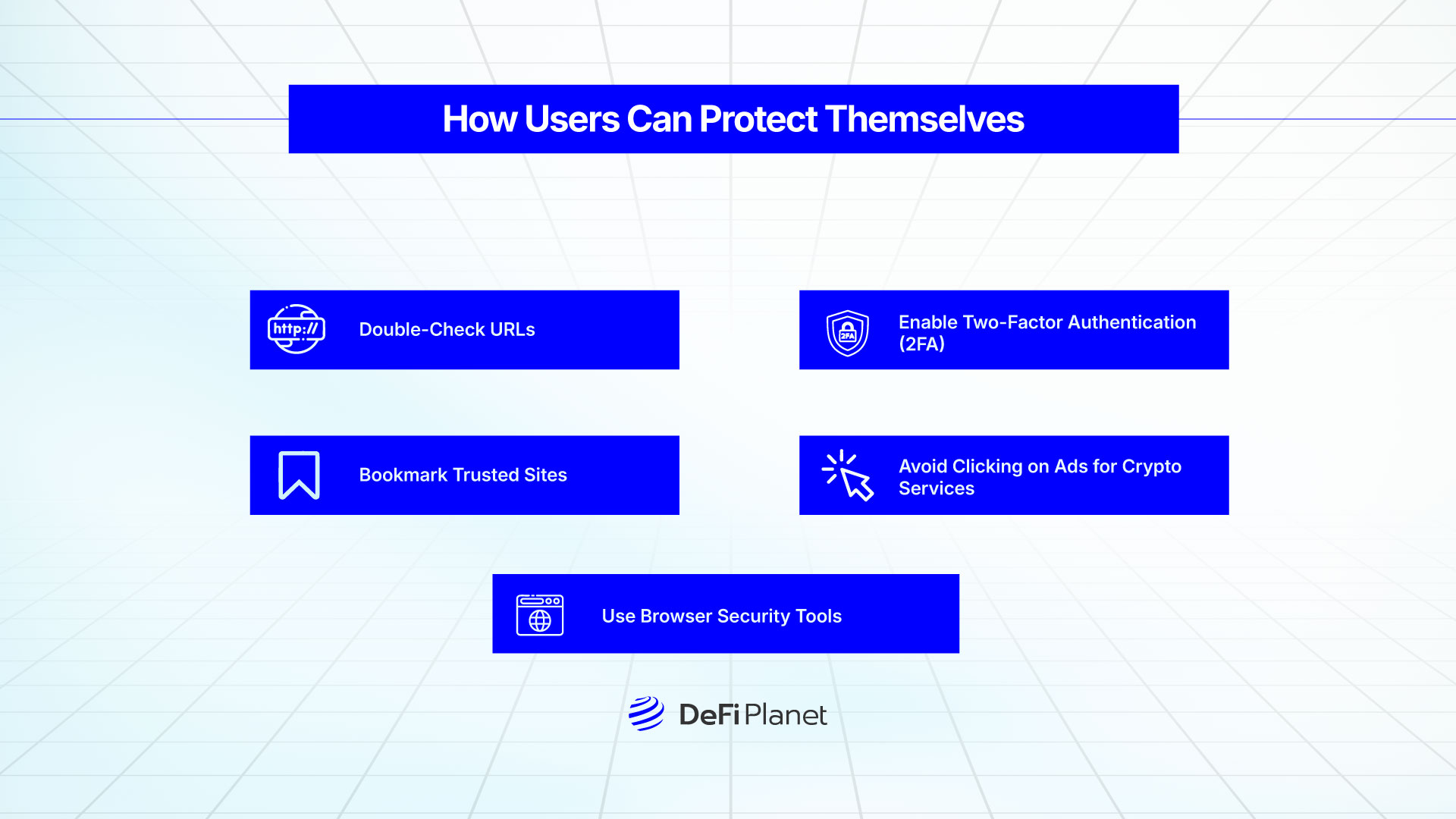Typosquatting in crypto has grow to be a world concern, the place a easy spelling mistake can lead to the theft of funds or compromise accounts. Scammers exploit minor typos in web site URLs or pockets addresses to trick customers into coming into delicate data on fraudulent platforms.
Since digital asset transactions are irreversible, falling for one in all these crypto scams can imply shedding belongings with no probability of restoration. Understanding these dangers is important for preserving your funds safe in an more and more digital and decentralized world.
This text explores how typosquatting works, the ways fraudsters use, real-world circumstances of crypto typosquatting, and the very best methods to stop falling sufferer to those assaults.
What’s Typosquatting?
Typosquatting, often known as area squatting, is a cybercrime tactic the place scammers register domains that carefully resemble reputable web sites, typically with slight misspellings or character substitutions. Within the crypto area, typosquatting is particularly harmful as a result of it exploits person errors to steal funds, credentials, or different delicate data.
How Cybercriminals Use Typosquatting in Crypto
Attackers create faux web sites that look nearly an identical to well-known crypto exchanges, wallets, or DeFi platforms. They tweak the URL in delicate methods, reminiscent of:
Misspellings: e.g., “Binace.com” as an alternative of “Binance.com”
Character swaps: e.g., “Kràken.com” utilizing an accented character as an alternative of “Kraken.com”
Additional or lacking letters: e.g., “Coinbsae.com” as an alternative of “Coinbase.com”
Hyphens or subdomains: e.g., “meta-mask.io” as an alternative of “metamask.io”
As soon as a sufferer lands on a fraudulent web site, they might unknowingly enter their login credentials or seed phrase, giving the scammer full management over their funds.
The Psychological Entice
Typosquatting depends on human error, one thing scammers know is inevitable. Many individuals sort in web site URLs manually, typically in a rush, making small typos with out noticing. Attackers additionally make the most of behavior and belief: if a web site appears to be like practically an identical to an actual one, customers are much less prone to query its legitimacy.
Moreover, these faux websites might use social engineering ways, reminiscent of pressing warnings about “account safety threats and points” or faux login prompts, to stress customers into offering private data.
Understanding how typosquatting works is step one in avoiding these crypto scams. Subsequent, we’ll discover the misleading ways fraudsters use to trick unsuspecting customers.
Frequent Typosquatting Techniques Utilized by Attackers
Attackers make use of numerous misleading ways to use customers’ belief and steal their cryptocurrency.
1. Misspelled Domains:
Attackers register domains with slight spelling variations of reputable websites, reminiscent of “binace.com” as an alternative of “binance.com.” Unsuspecting customers who mistype the URL could also be directed to those fraudulent websites, risking the publicity of delicate data.
2. Homoglyph Assaults:
This technique includes substituting characters in domains with visually comparable counterparts from completely different scripts. For instance, changing the Latin letter “a” with the Cyrillic “а” can lead to a website that seems an identical to the reputable one at a look. Such substitutions can deceive customers into believing they’re on a trusted web site.
3. Subdomain Spoofing:
Cybercriminals create misleading subdomains that mimic reputable companies. An instance is “login.google.com.instance.com,” the place “instance.com” is the precise area, deceptive customers into considering they’re on a real Google login web page. This tactic exploits customers’ familiarity with reputable subdomains to reap credentials.
4. Advert-Primarily based Crypto Scams:
Attackers make the most of platforms like Google Advertisements or social media to advertise malicious web sites. By buying advertisements, they’ll place their fraudulent websites prominently in search outcomes, growing the probability of person engagement. These advertisements typically mimic the looks of reputable promotions, additional enhancing their misleading potential.
Understanding these ways is essential for cryptocurrency pockets customers to navigate the digital surroundings safely. Vigilance and a focus to element might help stop falling sufferer to those refined schemes.
Notable Instances of Typosquatting in Crypto
In 2017, cybercriminals launched a intelligent rip-off to steal Bitcoin credentials utilizing Google search advertisements. These advertisements appeared on the high of search outcomes for phrases like “blockchain” and “Bitcoin wallets,” however as an alternative of resulting in the reputable Blockchain.information web site, they directed customers to faux web sites that carefully mimicked the actual platform.
Scammers registered domains like “blokchein.information” and “bockchain.information”, creating websites that regarded an identical to Blockchain.information’s login web page.
Unsuspecting customers who visited these websites and entered their login credentials unknowingly handed over entry to their Bitcoin wallets. The scammers then drained the wallets, raking in an estimated $10 million in Bitcoin between September and December 2016. By February 2017, the scheme was attracting round 200,000 visits per hour. In only one quick interval, they made $2 million inside 3.5 weeks.
Pretend Phantom Pockets Rip-off
In 2021, attackers used Google advertisements to advertise faux web sites that mimic the reputable Phantom Pockets web site. These advertisements seem in search outcomes for the actual Phantom Pockets web site, however the URLs have delicate misspellings or slight variations, reminiscent of “phanton.app” or “phantonn.pw” as an alternative of the proper area, “phantom.app.”
Customers who click on on these advertisements are led to a web site resembling the official Phantom Pockets web page. On the faux web site, customers are prompted to create a brand new pockets, together with writing down a restoration phrase and setting a password.
As soon as customers create the pockets, the scammers direct them to the actual Phantom pockets web site to put in the reputable Chrome extension. Nonetheless, the restoration phrase that the sufferer entered is already compromised and is being monitored by the attacker.
These scammers stole $500,000 value of cryptocurrency. The attackers accessed the sufferer’s pockets utilizing the restoration phrase and moved funds saved there into the attacker’s pockets, typically inside hours.
Crypto platforms and safety consultants are actually preventing again towards typosquatting by implementing quite a lot of proactive measures.
How Crypto Platforms and Safety Consultants Are Combating Again
Digital asset platforms and safety consultants are actively combating typosquatting in crypto and associated scams via a mixture of proactive measures:

Area Monitoring Companies
Exchanges and crypto platforms make the most of area monitoring companies to trace and determine fraudulent domains that carefully resemble their official web sites.
These companies alert organizations to potential typosquatting makes an attempt, enabling well timed actions reminiscent of area registration, authorized proceedings, or takedowns to stop person deception and shield model integrity.
Safety Alerts and Warnings
Platforms like MetaMask proactively warn customers about potential phishing assaults and fraudulent web sites. These platforms assist customers acknowledge and keep away from malicious domains designed to steal delicate data by displaying safety alerts and offering steerage on figuring out reputable websites.
Authorized Actions Towards Typosquatters
Firms actively monitor area registrations that resemble their model or service to determine potential typosquatting makes an attempt. When fraudulent domains are detected, organizations might provoke authorized actions beneath legal guidelines such because the Anticybersquatting Shopper Safety Act (ACPA) to reclaim domains and deter future infringements.
Blockchain-Primarily based Safety Options
Blockchain know-how provides decentralized id verification options that improve on-line safety. By permitting customers to manage and share their private knowledge securely, blockchain-based methods cut back the danger of id theft and fraud.
This strategy ensures knowledge integrity and privateness, addressing challenges confronted by conventional centralized id methods.
These mixed efforts show the crypto trade’s dedication to safeguarding customers and sustaining belief within the digital forex ecosystem.
How Customers Can Defend Themselves
Defending your self from typosquatting in crypto and associated scams includes a number of proactive measures:

1. Double-Verify URLs
Earlier than coming into any delicate data, at all times make sure the area identify is appropriate. Verify that the URL matches precisely with the reputable platform, and confirm any spelling errors. Moreover, search for safe connections (HTTPS) indicated by a padlock image earlier than coming into delicate data.
2. Bookmark Trusted Websites
Probably the greatest methods to keep away from unintentionally visiting a typosquatted area is to make use of bookmarks on your most often used crypto platforms. By saving trusted websites to your browser’s bookmark bar, you take away the necessity to manually sort URLs or search via Google, which may expose you to malicious advertisements or search engine outcomes selling faux web sites.
All the time be certain that the bookmarks are set for reputable, verified URLs to stop any unintentional typosquatting.
3. Allow Two-Issue Authentication (2FA)
Two-factor authentication provides an extra safety layer past only a password. By requiring a second type of verification, reminiscent of a code despatched to your cell phone or an authentication app, 2FA considerably reduces the danger of unauthorized entry to your accounts, even when somebody positive aspects entry to your login credentials.
That is notably necessary for cryptocurrency platforms, the place unauthorized entry may result in the lack of belongings. Allow 2FA in your wallets and exchanges to guard your accounts towards phishing assaults and typosquatting crypto scams.
4. Keep away from Clicking on Advertisements for Crypto Companies
Many scammers use Google Advertisements or social media platforms to advertise faux web sites or platforms that look an identical to reputable ones. Clicking on advertisements can lead you to fraudulent websites that trick you into coming into your credentials or restoration phrases.
As an alternative of clicking on paid advertisements, at all times navigate to crypto platforms by typing their reputable URL instantly into your browser or utilizing trusted bookmarks. This ensures you’re visiting the proper web site and never a typosquatted clone.
5. Use Browser Safety Instruments
Trendy browsers supply a number of safety instruments and extensions that may allow you to determine doubtlessly harmful web sites, together with these used for typosquatting. Instruments like “HTTPS In all places” and “Privateness Badger” assist make sure you connect with the encrypted, safe variations of internet sites.
Moreover, browser extensions reminiscent of “Malwarebytes” or “Internet of Belief (WOT)” can warn you for those who try to go to a web site that’s doubtlessly dangerous or recognized for typosquatting. These instruments add an additional layer of safety by flagging suspicious domains or web sites which may try and steal your private data.
By incorporating these security practices, you’ll be able to enormously decrease the danger of falling sufferer to typosquatting and crypto scams.
Closing Ideas
Vigilance and cybersecurity finest practices are essential the place typosquatting in crypto and phishing assaults are frequent threats. Double-checking URLs, utilizing bookmarks, enabling 2FA, and avoiding suspicious advertisements can cut back the danger of falling sufferer to fraud.
Crypto platforms additionally play a key position by monitoring fraudulent domains, issuing safety risk warnings, and utilizing blockchain-based options for safe id verification. Collectively, customers and platforms can create a safer crypto surroundings by staying knowledgeable and proactive towards these threats.
Disclaimer: This text is meant solely for informational functions and shouldn’t be thought of buying and selling or funding recommendation. Nothing herein must be construed as monetary, authorized, or tax recommendation. Buying and selling or investing in cryptocurrencies carries a substantial threat of monetary loss. All the time conduct due diligence.
If you want to learn extra articles like this, go to DeFi Planet and observe us on Twitter, LinkedIn, Fb, Instagram, and CoinMarketCap Neighborhood.
Take management of your crypto portfolio with MARKETS PRO, DeFi Planet’s suite of analytics instruments.”








